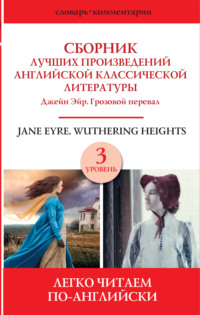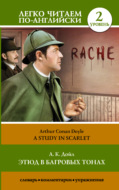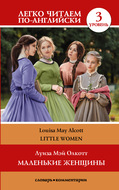Kitabı oku: «Сборник лучших произведений английской классической литературы. Уровень 3»
© Демидова Д.А.
© Прокофьева О.Н.
© ООО «Издательство, АСТ», 2021
Charlotte Brontё
Jane Eyre
Chapter 1
It was impossible to take a walk that day. Since dinner the cold winter wind had brought with it clouds so sombre, and a rain so penetrating, that further out-door exercise was out of the question. Instead, we had to amuse ourselves indoors1. I was glad of it: I never liked long walks, especially on chilly afternoons. My cousins, Eliza, John and Georgiana Reed were sitting round their mama in the drawing-room by the fire-side, but I was not allowed to join the group.
“You, Jane, are excluded from our company until I hear from Bessie that you can behave like a proper, sweet little girl,” announced Mrs. Reed.
“What does Bessie say I have done?” I asked.
“Jane, I don't like questioners; don't answer me back2. Be seated somewhere; and until you can speak pleasantly, remain silent.”
I went into another room, with a bookcase in it. I took one of the books, Bewick's History of British Birds, and climbed into the window seat. I drew the curtain, gathered up my feet, and sat cross-legged, like a Turk. Then I immersed myself into another world. I was now discovering the shores of Lapland, Siberia, Spitzbergen, Nova Zembla, Iceland, Greenland, with 'the vast sweep of the Arctic Zone, and that reservoir of frost and snow. Of these death white realms I formed an idea of my own: shadowy, like all the half-comprehended notions that float dim through children's brains, but strangely impressive.
The book contained pictures, and each picture told a story. These stories were as interesting as the tales Bessie sometimes told us on winter evenings when she was in good humour.
With Bewick on my knee, I was then happy: happy at least in my way. I feared nothing but interruption, and that came too soon. The breakfast-room door opened.
“Boh!” cried the voice of John Reed. Then he paused as he thought the room was empty. “Where is she? Lizzy! Georgy! Tell Mama! Jane's run out into the rain!”
“She's in the window seat,” Eliza said at once.
I came out immediately before John could drag me out.
“What do you want?” I asked.
John Reed was a fourteen-year-old schoolboy, four years older than I. He was large and stout for his age, and he bullied me continually. I hated and feared him, I could do nothing against him. The servants did not like to offend their young master, and Mrs. Reed was blind and deaf on the subject.
All at once, without speaking, John struck suddenly and strongly
“That is for your rude answer to mama, for hiding behind curtains and for the look you had in your eyes, you rat,” he said.
“What were you doing behind that curtain?”
“I was reading.”
“Show me the book.”
I gave him the book.
“You have no right to take our books. You have no money, your father left you none, you should beg, and not live with us. Now, I'll teach you a lesson. Go and stand by the door.”
I did so, then waited, flinching. He hurled the heavy book at me. It hit me and I fell, striking my head against the door and cutting it. The cut bled, the pain was sharp: suddenly my terror was gone, and I was full of anger.
“Wicked and cruel boy! You are like a murderer!”
“Did she say that to me? Did you hear her, Eliza and Georgiana? Won't I tell mama? but first-“
He grasped my hair and my shoulder. I don't very well know what I did with my hands, but he called me 'Rat! Rat!', Eliza, and Georgiana ran for Mrs. Reed.
We were parted, and Mrs. Reed was standing over me.
“Dear, dear,” said Abbott, shaking her head. “What a fury, to fly at master John!”
“Take her away to the red-room,” said Mrs. Reed, “and lock her in there.”
The red-room was the biggest bedroom in Gateshead Hall, with a red carpet, red damask drapery, red velvet curtains, and a dark mahogany bed in it. Nobody slept there. Nobody wanted to. It was here, nine years before, in that very bed that Mr. Reed had died. Ever since I had often heard the servants whispering that it was haunted.
I resisted all the way. Bessie and Abbott had to force me through the door. I only stopped struggling when they threatened to tie me to a chair.
“What shocking conduct, Miss Eyre, to strike a young gentleman! Your young master.”
“Master! How is he my master? Am I a servant?”
“No; you are less than a servant, for you do nothing for your keep,” said Miss Abbot.
“Miss Eyre, you should be grateful to Mrs. Reed for keeping you,” said Bessie, in a kinder voice. “If you don't behave, she might send you away3, and then where would you be?”
“You'd better say your prayers, Miss, and ask for forgiveness,” said Abbott.
They left and locked the door behind them.
Left alone, holding furiously onto the chair I had been pushed into, I turned the afternoon's events over and over in my mind4. Why did everyone adore selfish, rude John, Georgiana and Eliza, and hate me, even though I tried to be good? Was it because they were pretty, with their golden curls and silk dresses, and I was poor and plain? “Unjust! – unjust!” said a voice in my head.
The room was silent as it was far from the nursery and kitchen. It was getting dark as the daylight faded and I had no candle. It was cold too as there was no fire. I thought about Mr. Reed. He had been my uncle-my mother's brother. When my parents had died, I was a baby, and my uncle Reed had brought me to live at Gateshead Hall. Bessie had told me that Mrs. Reed only continued to look after me because, just before his death, Mr. Reed had made her promise that she would.
He had always been kind to me. Perhaps now his spirit was watching5, and was angry about the way they treated me. Perhaps-I gripped the chair more tightly, and felt frightened-perhaps his ghost really lived in this room.
The thought of seeing a ghost, even kind Mr. Reed's ghost, filled me with terror. I was not quite sure whether Abbott and Bessie had locked the door; I got up and went to see. Alas! yes. I stared into the darkness in panic, convinced a phantom was about to appear.
At this moment a light gleamed on the wall and began to glide slowly across the ceiling towards me.
Looking back, I know it was probably nothing more than a footman carrying a lantern across the lawn6. But, in my terrified state of mind, I believed it was the ghost. My head grew hot, something seemed near me. I rushed to the door and shook the lock in desperate effort screaming.
I heard footsteps, the key turned, Bessie and Abbot entered.
“Take me out! Let me go into the nursery!” I cried.
“What for? Are you hurt? Have you seen something?” demanded Bessie.
“I saw a light, and I thought it was a ghost…”
“What is all this?” It was Mrs. Reed. “Bessie, I told you to leave Jane alone.”
“Miss Jane screamed so loudly, ma'am…”
“You cannot get out by these means, child,” Mrs. Reed said. “It is my duty to show you that tricks will not work. You will now stay here an hour longer.”
“O aunt! have pity! Forgive me!”
But I was only an actress in her eyes. Bessie and Abbot left first, Mrs. Reed pushed me back into the room and locked me in.
Left alone once more, I fell unconscious, as that was the last thing I remembered.
Ücretsiz ön izlemeyi tamamladınız.









